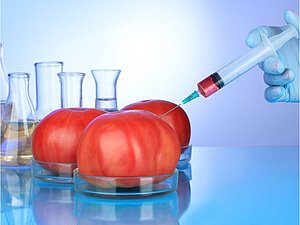Genetically modified organisms (GMO)
Topic description
General

The European and the Slovenian legislations concerning genetically modified organisms (hereinafter referred to as GMO) are aimed at ensuring the protection of human health, animal health, environment, whilst ensuring free movement of GMOs in the internal market of the EU.
“GMO” means a live organism in which the genetic material has been altered in a way that does not occur naturally by mating and/or natural recombination. Through the use of modern biotechnology, the selected genetic material can be transferred from one organism to another which may be of a different sort. The term GMO is precisely defined in Directive 2001/18/EC of the European Parliament and of the Council of 12 March 2001 on the deliberate release into the environment of genetically modified organisms and repealing Council Directive 90/220/EEC (hereinafter referred to as: Directive 2001/18/EC).
Placing on the EU market of the genetically modified food or feed products is subject to an authorisation which is granted under the prescribed procedure.
The Inspectorate of the Environment and Spatial Planning of the Republic of Slovenia performs inspections of the presence of GMOs in food and feed products which are not of animal origin, while the Inspectorate for Food Safety controls the presence of GMOs in such products of animal origin. Inspections of food supplements, foodstuffs intended for particular nutritional or health uses, foodstuffs and food in hospitality operations, institutional catering and canteens are carried out by the Ministry of Health of the Republic of Slovenia.
Pursuant to the Management of Genetically Modified Organisms Act , customs authorities have the following functions:
- in the course of regular controls, they perform documentary and identification inspections with regard to Articles 50 and 51 of the above mentioned act;
- in the case of suspected infringements of Articles 50 or 51 of the mentioned act, they detain a GMO consignment or a GMO product and inform an official veterinary or phytosanitary inspector who performs a physical inspection of the consignment and takes the necessary measures.
The customs authority must inform at once the Ministry of the Environment about the infringements of the GMO legislation.
Legislation
Agreements, convetions & protocols
EU legislation
Regulations
- Regulation (EC) No 1829/2003 of the European Parliament and of the Council of 22 September 2003 on genetically modified good and feed
- Regulation (EC) No 1830/2003 of the European Parliament and of the Council of 22 September 2003 concerning the traceability and labelling of genetically modified organisms and the traceability of food and feed products produced from genetically modified organisms and amending Directive 2001/18/EC
Directives
- Directive 2001/18/EC of the European Parliament and of the Council of 12 March 2001 on the deliberate release into the environment of genetically modified organisms and repealing Council Directive 90/220/EEC



